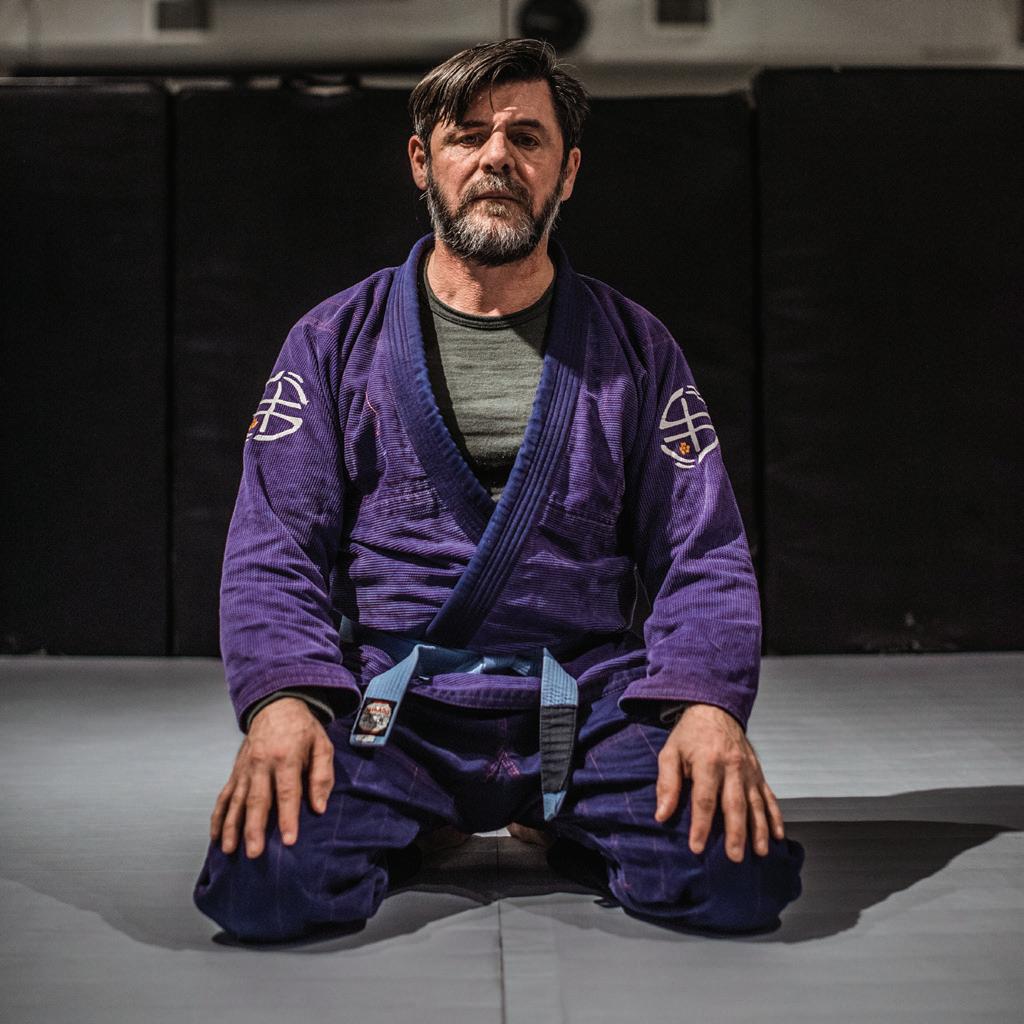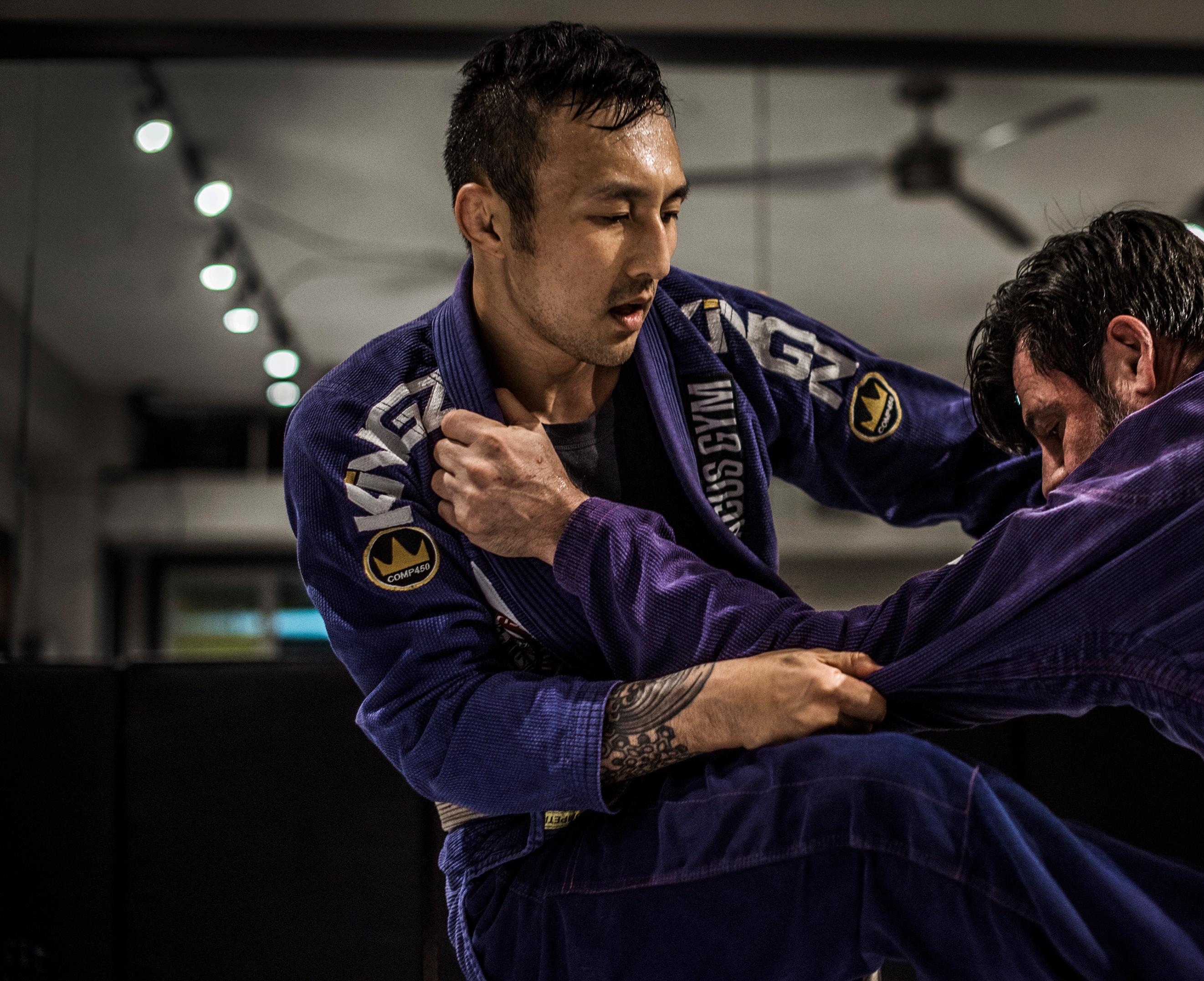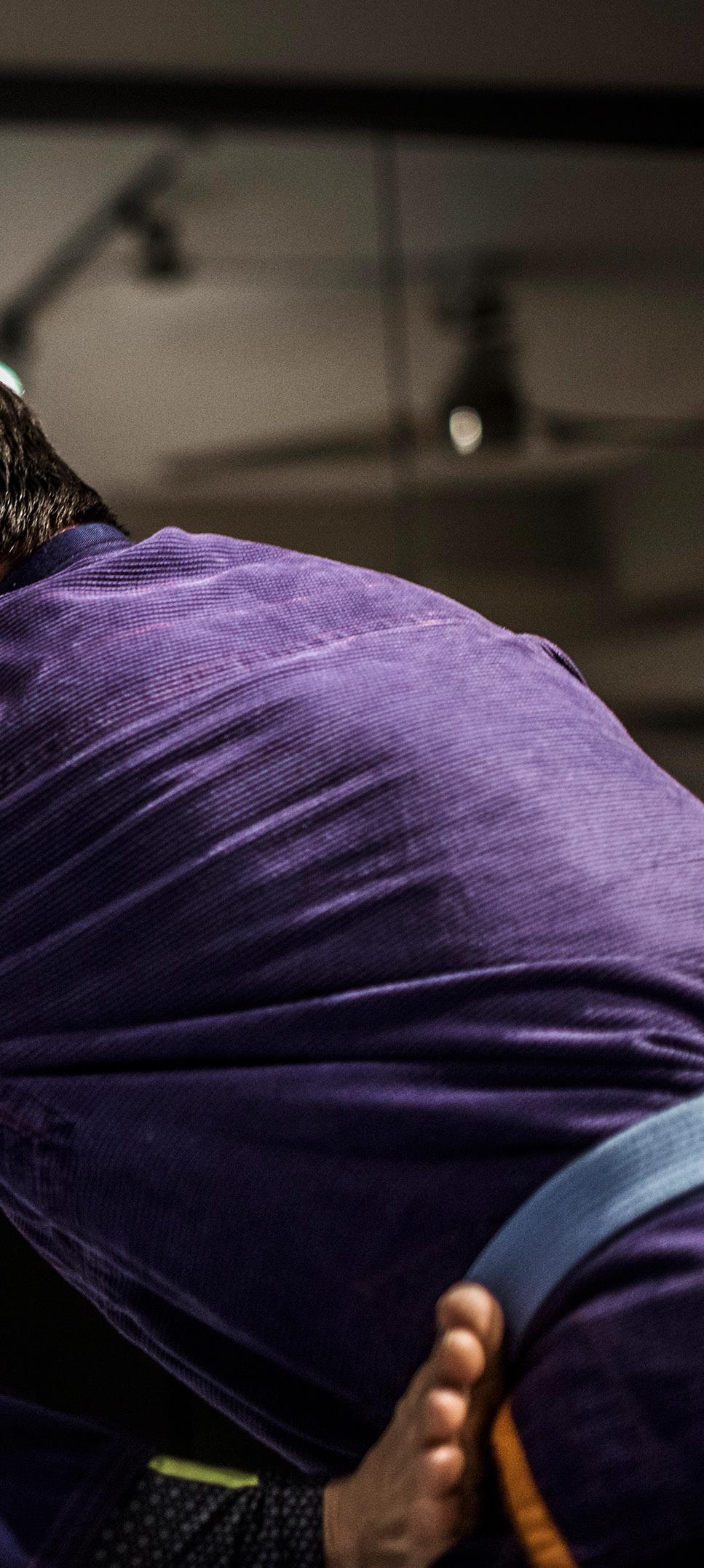
8 minute read
THE PEACEFUL WARRIOR Brazilian Jiu Jitsu is the unlikely vehicle for
from Still Magazine
by cmns490
“Rolling” as therapy. Despite suffering from PTSD, DeCroo finds opportunities for growth amid the crush and complexity, the submission chokes and locks of Jiu Jitsu.
the PEACEFUL warrior
Advertisement
RODNEY DECROO GIVES HIMSELF A FIGHTING CHANCE AGAINST THE TRAUMATIC EFFECTS OF YEARS-LONG ABUSE AND ADDICTION. THE UNLIKELY VEHICLE FOR HIS ACCELERATED RECOVERY: THE BRAZILIAN MARTIAL ART, JIU JITSU.
IIt’s a Friday night and just off Vancouver’s Commercial Drive, in a dimly lit subterranean room with mirrored walls, two men square off. Within moments they’re both clinched on the ground, tumbling, backs flared with exertion. Strong hands grasp lapels but then are ripped away until they reassert themselves on sleeves, around wrists. Though their breathing is ragged the men’s faces are expressionless until one— an athletic man with tattoos flashing out from under his cuffs and open jacket—manages to pin the other, grinding his shoulder into his opponent’s face, turning it to the floor.
The one lying on his back, a younger Anthony Hopkins-type, grimaces silently, enduring the discomfort. His forehead glistens with sweat, his face a mask of forbearance. Methodically, he counters by wedging one arm under his opponent’s abdomen and pushing the blade of his other forearm across his adversary’s throat. Then, aggressively bridging his body and sliding his hips side to side, he manages to break free. But the respite is short. A few moves later, in a fluid motion, the man slips one arm around Hopkins’ neck from behind, deftly latching onto the bicep of his other arm, and locks onto Hopkins’ back in a tight hold. He hooks the heels of both feet inside Hopkins’ legs. This time the grimace is deeper and strangled. A brief fight to tear away the choking arm is followed by a quick tap-tap. The man releases
Hopkins immediately. They roll onto their knees, breathing hard, straightening their story by MILANA BUCAN

photography by EKATERINA USMANOVA
Roy Duquette, owner of Spartacus Gym on Commercial Drive, is DeCroo’s instructor: ”I consider Rodney my biggest success as a teacher.”

clothes. They face each other and after a quick bro-pound, they go at it again.
To say that Rodney DeCroo, 51, resembles Anthony Hopkins is to say that his face has character. A deeply-lined, distinctive face that hints at earned experience, none of it easy. A lock of hair carefully groomed into place speaks of someone who is conscious of how he looks. Someone for whom it matters how he is perceived. Since he is a performer—a singer-songwriter, poet and actor—this impression of DeCroo would be correct. Since he is a recovering addict and a childhood victim of physical, sexual and emotional abuse, the impression of a hard life is also dead accurate. Just five years ago, DeCroo’s immediate reaction to any physical confrontation might have been unmitigated violence.
DeCroo first met his adversary, gym owner and martial arts instructor Roy Duquette, four years ago. “DeCroo first stepped on the mats in spring of 2014 as an unpredictable, spastic, insecure, egotistical, self-centered, narcissistic time-bomb waiting to explode,” wrote Duquette in a Facebook post. “He started asking me questions about how to improve his fitness and his cardio, and he told me that he was a musician, a songwriter, a performer. This was the first time he humanized himself. Week by week and month by month, DeCroo’s dedication, perseverance and persistence started to change him.” The post was written to acknowledge DeCroo’s accomplishment in earning a blue belt three years after that first meeting.
On this February afternoon, DeCroo sits just inside the entrance of his regular cafe near his home of 27 years on Commercial Drive in east Vancouver. Relaxed, he wears dark denim jeans and a hoodie with an oversized winter down jacket. As he stands to greet me, his hand goes up to move that characteristic lock of hair out of his eyes. He’s kindly taking a break from working hard to memorize 87 pages of a script for a David Harrower play titled Blackbird, a play that takes the stage next month. DeCroo is also a published poet and a singer who last year released his eighth album, Old Tenement Man. DeCroo was born in Pittsburgh and mostly grew up there until his father, who had deserted the US Marines after serving in the Vietnam War, brought them to B.C. His mother took them back to Pittsburgh, but DeCroo returned here when he was 16 to rejoin his father, moving around northern B.C. and the Kootenays, before settling by himself in Vancouver. In a Georgia Straight article about DeCroo’s work, Rebecca Blissett wrote of his childhood: “DeCroo had an upbringing that might charitably be described as fucked. Poverty, violence, and abuse—physical and mental—were all part of a cocktail that left deep scars well into adulthood.” It wasn’t until he was in his 30s that DeCroo was officially
years of traumatic events. Like many others, he could get physical in a controlled environhe used drugs and alcohol to deaden the pain. ment and with a handful of other practitioners. In 1999, he tried to find a permanent solu- He could repeatedly deal with his emotions. tion in suicide, and was hospitalized after an Even though at times he felt vulnerable and unsuccessful attempt. deflated, the practice forced him to think about After getting sober 18 years ago, DeCroo his opponents and their well-being too. tried many paths to healing, including ther- Despite outwardly looking like an adverapy, meditation and physical activity. “My sarial interaction, BJJ involves symbiotic relatherapy was going okay,” DeCroo recalls. tionships hinging on reciprocal trust and the “I was progressing, but I was progressing willingness to help each other improve. The slowly. And then I met Roy Duquette who behaviour that PTSD elicits is the antithesis owns Spartacus Gym down on Commercial of that. “You react to PTSD,” says DeCroo, “you Drive. A lot of my trauma was associated with make mistakes. You’re overreacting. You’re isoviolence, and BJJ is exposure to violence con- lating and constantly destroying relationships, tained by safe practice and technique.” constantly destroying careers, constantly in BJJ, Brazilian Jiu Jitsu, is a martial art state of crisis. PTSD treatment is essential and that focuses on grappling and ground fighting, there’s just no way around it, you have to get promoting the concept that a smaller, weaker help.” person can defend himself through tech- As his coach and mentor, Duquette firmly nique. Size, strength, and stamina are obvious believed that with hard work and dedication factors in winning a fight, but a strong mind DeCroo would be able to use Brazilian Jiu Jitsu and the ability to maintain presence and keep as a means to help him align all aspects of his calm are also fundamental elements. It’s a life. And Duquette understood that there was a violent sport nonetheless, one that brought certain urgency. He didn’t sugarcoat his words DeCroo flashbacks.“I would go into Jiu and he put pressure on DeCroo, forcing him to Jitsu and I would be triggered over and over do better and keep going. again. But the way you deal with triggers is by “You’re not young,” Duquette told him. being in the moment and BJJ puts you in the “You’ve already fucked up your life, you’ve moment by having you focus on technique messed up your career, you’ve damaged your and your training partner,” DeCroo explains. health, and you need to do everything right Duquette wrote of DeCroo’s process in his starting today. There’s no time.” Facebook post, “It was a means of immersing “In my teens, and then into my twenties, the things I chose to do, I kept exposing myself to more trauma,” admits As his coach and mentor, Duquette firmly believed that with hard work and dedication DeCroo would be able to use Brazilian Jiu Jitsu as a Decroo. “With the drugs and alcohol I was always exposed to violence. It’s been a long process but along the way means to help him align all aspects of his life. And Duquette understood that there was a certain urgency. He didn’t sugarcoat his words. He put I had people who inspired me to write poetry and music, to pursue the arts and help me recover.” pressure on DeCroo, forcing him to do better and keep going. For DeCroo, BJJ is just one part of this process, albeit an important one. “Self-care is what it comes down to: seven to eight hours of sleep, nourdiagnosed with PTSD. himself into the darkest side from his past, and ishing food. I don’t smoke. I don’t drink. I have
Post-traumatic stress disorder (PTSD) can learning to swim and navigate in those murky an exercise regimen; a workout of some kind is develop in people who have experienced a sin- waters, instead of fearing it and running away important. For me, I have to go to my 12-step gle traumatic event in their life. Physical symp- from it. Using Jiu Jitsu as his vehicle, Decroo program. I have to practice my passion of cretoms include chronic pain years after the event, has learned to overcome his own ego and gain ating poetry, music and acting, and ultimately substance addictions, depression and anxiety, control over the demons that used to lead him doing something that I love to do,” says DeCroo. and difficulties maintaining relationships and down the dark path of self-destruction. A walk- Caring for himself, caring for others, and jobs. People with PTSD often have flashbacks, ing time-bomb no more.” doing what he loves to do even when uncomnightmares and bad dreams that can become so For DeCroo, three to four nights a week the fortable—DeCroo is still in a constant fight but severe that they interfere with everyday rou- small underground room in Spartacus Gym sometimes fighting is necessary to find some tines and tasks. DeCroo’s PTSD comes from padded with floor mats became his haven. Here peace. ■











